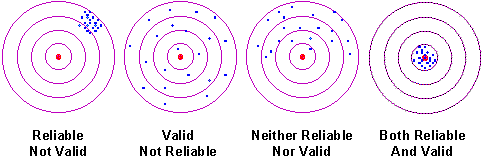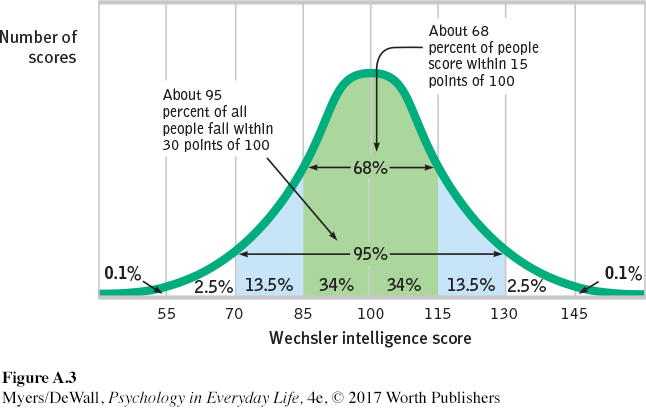<< Hide Menu
5.10 Psychometric Principles and Intelligence Testing
5 min read•june 18, 2024
Dalia Savy
Sadiyya Holsey
Dalia Savy
Sadiyya Holsey
Measuring Intelligence
You know how psychologists describe variables using an operational definition? Intelligence is very subjective, too, but psychometricians are involved in trying to create some sort of test that measures intelligence.
A good test must be:
- 🔔 Standardized—having uniform testing procedures and the test must be graded the same way for everyone. The performance on the test is usually examined with a pretested group and scores should form a normal curve.- Examples of standardized exams that you know of are the SAT, ACT, and AP exams.
- 🔄 Reliable—For a test to be reliable, it has to yield the same results multiple times. It is best to test reliability by retesting and seeing if the score distribution is similar.
- 🔄 Valid—Validity is the extent to which the test predicts what it is supposed to. Reliability and validity are two completely different things and they cannot predict each other.
🎯Target analogy:
- If you were to shoot a bunch of darts and they all landed to the right of the middle, you would have reliable results, but not valid results.
- If you were to shoot a bunch of darts that landed slightly above the middle, slightly below the middle, and slightly on the sides of the middle, with a few darts far away, you would have valid results, but not reliable results.

Image Courtesy of Conjoint.
Types of Tests
There are two primary types of tests:
- 🧠 Achievement Test—Checks what someone has already learned, like the unit exams you have at school or the AP test at the end of the year.
- 🤔 Aptitude Test—Designed to predict someone's success in the future. An example of this is the ACT or SAT, which are said to give colleges an idea of how prepared you are for college.
Development of Tests
Alfred Binet
Binet was hired to study an education problem in France 🇫🇷 In order to complete his task, he wanted to compare a child's potential to what the child was actually doing. With this, he came up with mental age.
Mental age is the age at which a person functions intellectually. For example, a 9-year-old could have a mental age of a 14-year-old because of their advanced knowledge in certain subjects. If a child has a mental age below their actual age, it means they struggle a little academically.
The idea of an IQ (intelligence quotient) arrived during this time.
IQ = mental age / chronological age x 100
This explains why the average IQ is 100. If someone is 15 years old with a mental age of 15, their IQ is exactly 100.
Grit
Grit is basically passion and determination used to pursue a long-term goal.
Lewis Terman
It was eventually realized that IQ cannot cover all ages. For example, how do we distinguish the mental age of a 53 year old from the mental age of a 52 year old? It's basically impossible, because there isn't much development going on during adulthood years 🤷
Therefore, Terman came up with the Stanford-Binet Test, which was deviation based rather than ratio based.
David Wechsler
The Wechsler Adult Intelligence Scale is the most used intelligence test and contains different subtests like:
- Testing similarities
- Testing vocabulary 💭
- Testing design and visual processing 🍥
- Testing letter and number sequences 🅰️ 1️⃣ It is so well known that there is also a Wechsler Intelligence Scale for Children.
Francis Galton—Eugenics
He didn't come up with an intelligence test, but he wondered if there was a way we could test intelligence and then match people with higher IQs together. He was part of the movement to encourage only people with high IQs to reproduce 🤦
The Normal Curve
We keep talking about a normal curve and deviation, but do you remember what those terms are?
Intelligence scores usually form a normal curve, which is a bell-shaped curve with two extremes and a large middle. Let's discuss it:

Image Courtesy of Macmillan,
The farthest right is the top percentile for IQ, and the farthest left on the curve is the bottom percentile for IQ. The middle 68.2% represents average IQ. Only about 2.6% of people are gifted. The 13.5% on the curve represents above average IQ but not gifted.
This normal bell curve, as we discussed in unit 1, is all about intelligence scores on the Wechsler Intelligence Scale.
The Low Extreme 📉
Having an IQ that is below a score of 70 often means that there is some sort of intellectual disability that causes a person to:
- have limitations in learning 📖
- have a hard time solving problems 🤔
- have a hard time communicating 🗣️
- lack in many skills needed for everyday life 👔 People with an intellectual disability have a really hard time adapting to the demands of life that require conceptual, social, and practical skills.
An example of an intellectual disability is down syndrome.
The High Extreme 📈
Those that are usually on the higher end of the normal curve are gifted 🎁 Their talents and intellect are beyond what is considered one’s normal Mental Age.
Savant Syndrome
Individuals with savant syndrome perform poorly on intelligence tests and have serious intellectual disabilities. However, they have a certain talent or skill that is above average.
An example of this is someone that can barely produce and understand language, but is a genius when it comes to mathematical calculations 🧮
Bias in IQ tests
Every test has some sort of bias, and Earl Hunt and Jerry Carlson had a debate over differences in IQ. The stereotype threat is one of the ways ones test score could be affected because of bias.
Stereotype Threat
The stereotype threat is where someone may do worse on a test because they are told they aren't good enough (because of the stereotypes that exist in society). If a Black woman is told she is incapable of passing a medical exam, she may doubt herself and the stress could impair her performance. The stereotype threat causes a change in our behaviors which, in turn, affects our IQ.

© 2024 Fiveable Inc. All rights reserved.